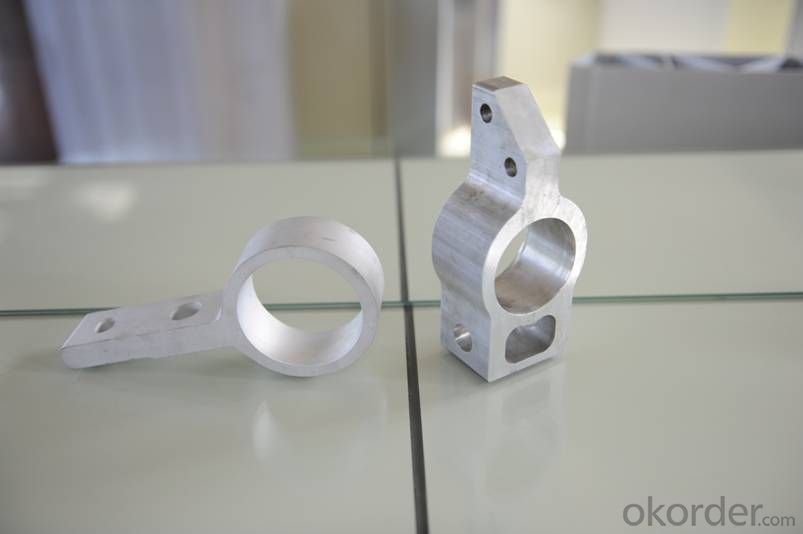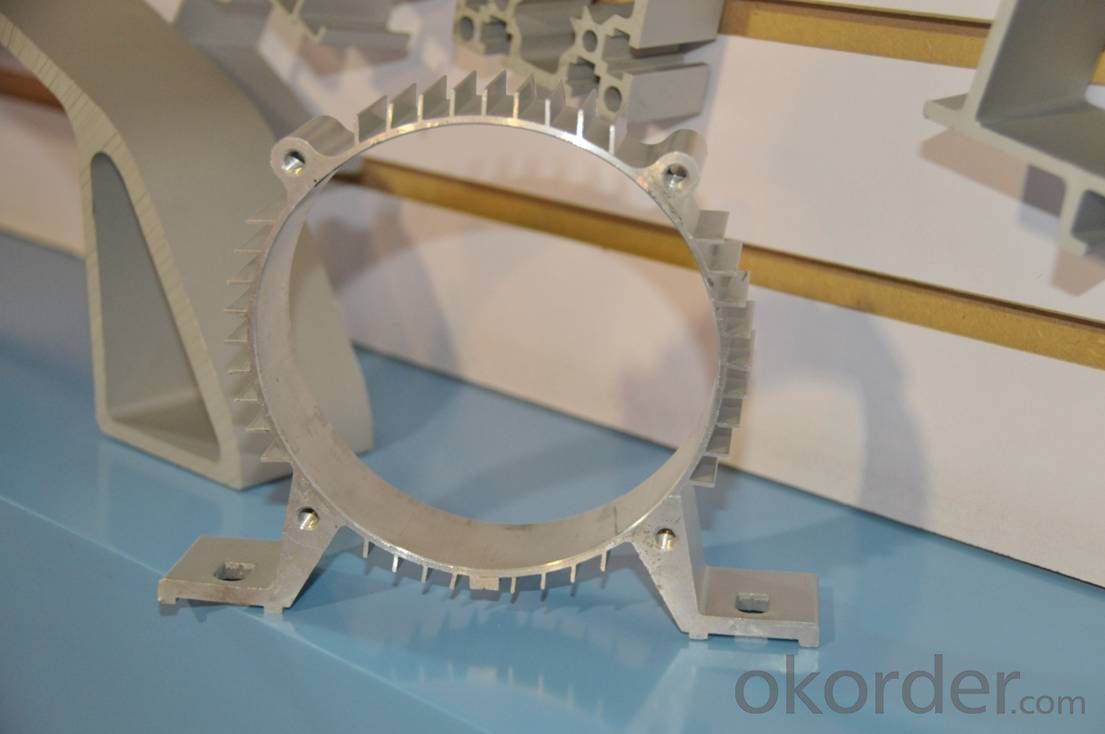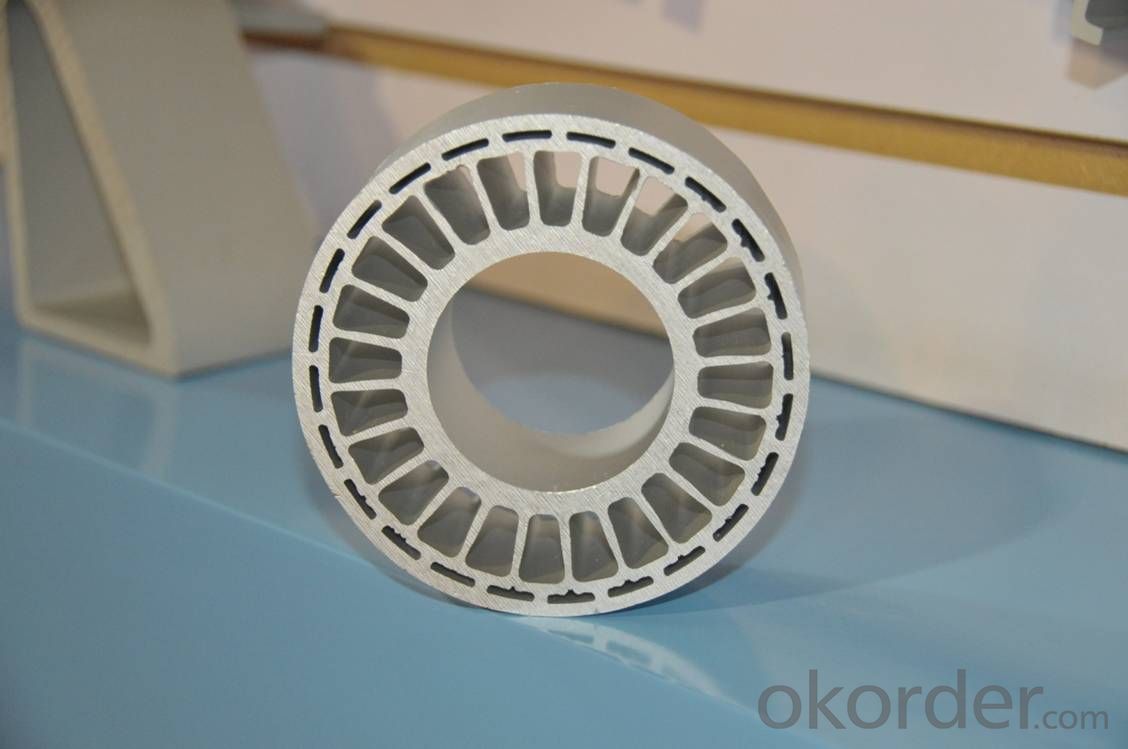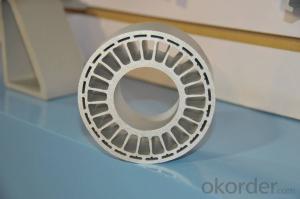Aluminum Profiles for Roller of Automate Equipment
- Loading Port:
- Shanghai
- Payment Terms:
- TT OR LC
- Min Order Qty:
- 5 m.t.
- Supply Capability:
- 1000 m.t./month
OKorder Service Pledge
OKorder Financial Service
You Might Also Like
Item specifice
1. Structure of Aluminum Profiles for Roller of Automate Equipment Description
Aluminum Profiles for Roller of Automate Equipment is one semi-finished aluminium material. The alloy AA6063 is widly used in building, industry ect. Its weight is much lower than steel. So many customers choosed aluminium material instead of steel.
2. Specification of Aluminum Profiles for Roller of Automate Equipment
Aluminum Profiles for Roller of Automate Equipment | |
Main Specification | |
Alloy | AA1xxx (AA1050, AA1060, AA1070, AA1100 etc.) |
AA3xxx (AA3003, AA3004, AA3005, AA3105 etc.) | |
AA5xxx, AA6XXX (AA5052,AA5083, AA5754, AA6061, AA6062 etc.) | |
AA8xxx(AA8011, AA8006 etc.) | |
Temper | H14,H16, H18, H22, H24, H26, H32,O/F, T4, T6, T651 |
Thickmess | 0.01mm-100mm |
Width | 30mm-1700mm |
Standard | GB/T 3880-2006/ASTM |
Special specification is available on customer's requirement | |
3. Application of Aluminum Profiles for Roller of Automate Equipment
(1).Interior: wall cladding, ceilings, bathrooms, kitchens and balconies, shutters, doors...
(2).Exterior: wall cladding, facades, roofing, canopies, tunnels,column covers , renovations...
(3).Advertisement: display platforms, signboards, fascia, shop fronts...
4. Feature of Aluminum Profiles for Roller of Automate Equipment
Surfact Quality :
Be free from Oil Stain, Dent, Inclusion, Scratches, Stain, Oxide Dicoloration, Breaks, Corrosion, Roll Marks, Dirt Streaks and other defect which will interfere with use,
Mechenical Property:
Chemical Composite and Mechanical Property
5. Certificate of Aluminum Profiles for Roller of Automate Equipment
SGS and ROHS(if client request, paid by client), MTC(plant provided), Certificate of Origin(FORM A, FORM E, CO), Bureau Veritas and SGS (if client request, paid by client), CIQS certificate
6. Image of Aluminum Profiles for Roller of Automate Equipment



7. Package and shipping of Aluminum Profiles for Roller of Automate Equipment
First, plastic cloth with drying agent inside; Second, Pearl Wool ; Third, wooden cases with dry agent , fumigation wooden pallets, aluminum surface could cover blue PVC film
8. FAQ
1) What is the delivery time?
Depends on actual order, around 20 to 35 days
2) What is the QC system:
We have QC staff of 20 persons and advanced equipment, each production is with MTC traced from Aluminum ingot lot.
3) What market do you mainly sell to?
Australia, America, Asia, Middle East, Western Europe, Africa etc
- Q:What are the environmental benefits of using aluminum coils?
- Using aluminum coils offers numerous environmental advantages. Firstly, aluminum is an incredibly sustainable material due to its abundance on Earth and easy extraction from bauxite ore. Unlike other metals, aluminum can be recycled endlessly without losing its physical properties. Consequently, opting for aluminum coils assists in reducing the demand for extracting new resources and lessening the environmental impact of mining activities. Secondly, the lightweight nature of aluminum makes it more energy-efficient during transportation. Its low weight diminishes fuel consumption and greenhouse gas emissions associated with shipping and logistics. Moreover, aluminum coils can be easily molded and shaped, enabling efficient packaging and reducing the necessity for excess materials. Furthermore, aluminum possesses exceptional thermal conductivity properties. This means that aluminum coils can effectively transfer heat, leading to more energy-efficient heating and cooling systems. Incorporating aluminum coils into HVAC systems or heat exchangers reduces energy consumption, resulting in lower carbon dioxide emissions and a smaller carbon footprint. Additionally, aluminum boasts high resistance to corrosion and can withstand harsh weather conditions. This durability ensures a longer lifespan for aluminum coils, decreasing the need for frequent replacements and minimizing waste generation. Lastly, aluminum is non-toxic and poses no threat to human health or the environment. It does not release harmful substances or pollutants during production or use. Consequently, aluminum coils prove to be a safe and environmentally-friendly choice for various applications. To summarize, the environmental advantages of using aluminum coils encompass sustainability, recyclability, lightweight properties, energy efficiency, durability, and non-toxicity. By selecting aluminum coils, we contribute to resource conservation, energy savings, and a healthier planet.
- Q:What are the factors that affect the cost of aluminum coils?
- The cost of aluminum coils can be influenced by various factors. Firstly, the price of aluminum itself can fluctuate based on global supply and demand, as well as market conditions. These fluctuations directly impact the cost of aluminum coils. Secondly, the manufacturing process involved in producing aluminum coils plays a significant role in determining their cost. Different techniques, such as casting, rolling, and annealing, each have their own associated costs. The complexity and efficiency of the manufacturing process can directly affect the final price of the coils. Additionally, the size, thickness, and specifications of the coils can also impact their cost. Larger coils or those with specific dimensions may require extra raw materials, processing time, or specialized equipment, leading to higher costs. The type of surface finish applied to the coils is another factor that influences their price. Coils with higher-quality finishes, such as brushed or coated surfaces, require additional processing and materials, making them more expensive. Furthermore, the quantity and order volume of aluminum coils can affect their cost. Larger order quantities often result in economies of scale and lower unit costs. Conversely, smaller orders or customized specifications may incur additional setup costs or higher per-unit prices. The level of competition in the aluminum coil industry also plays a significant role in pricing. Increased competition among manufacturers can lead to more competitive prices as companies vie for customers. Conversely, limited suppliers or unique product offerings can drive prices higher due to reduced competition. Transportation and logistics costs are another factor to consider. The distance, mode of transportation, and fuel prices impact shipping costs, which can be passed on to customers. It is important to note that these factors are not exhaustive and may vary depending on specific circumstances and market dynamics. Additionally, external factors like taxes, tariffs, and government regulations can also influence the cost of aluminum coils.
- Q:Briefly describe the process of aluminum production from bauxite. Describe the electrolyte and write the anode and cathode half-reactions.
- Bauxite is dissolved in NaOH to remove impurities and form aluminum hydroxide; the aluminum hydroxide is then precipitated out, and water is removed to produce pure aluminum oxide (alumina). In aluminum production, alumina (Al2O3) is dissolved in molten cryolite (Na3AlF6). This molten mixture is then placed in a container with graphite electrodes (cathode and anode are both graphite). The molten mixture serves as the electrolyte. At the cathode: Al3+ (l) + 3e- ---- Al (l) Aluminum ions gather electrons to form aluminum metal, which is liquid due to the high temperatures. The molten metal sinks to the bottom of the container, and is piped off. At the anode: 2O2- (l) --- O2 (g) + 4e- The oxide ions from alumina lose their electrons to form oxygen gas.
- Q:How do aluminum coils contribute to increased structural stability?
- Aluminum coils contribute to increased structural stability in several ways. Firstly, aluminum as a material is highly durable and has excellent strength-to-weight ratio. This means that even though aluminum coils are lightweight, they offer superior strength and stability, making them an ideal choice for structural applications. Additionally, aluminum coils are corrosion-resistant, which is crucial for maintaining structural integrity over time. Unlike other metals, aluminum does not rust or deteriorate easily, even in harsh environmental conditions. This corrosion resistance ensures that the coils will remain structurally sound and reliable for extended periods. Moreover, aluminum coils have high thermal conductivity, which allows for efficient heat transfer. This characteristic is essential for structures exposed to temperature variations, as it helps to distribute and dissipate heat evenly, preventing any potential damage due to thermal expansion or contraction. Another significant advantage of aluminum coils is their flexibility. Aluminum is a malleable material that can be easily bent, shaped, and formed into various configurations. This flexibility allows for more intricate designs and enables the coils to adapt to different structural requirements, enhancing overall stability. Furthermore, aluminum is a non-combustible material, making it a safe choice for structural applications. In the event of a fire, aluminum coils will not contribute to the spread of flames, thus maintaining the integrity of the structure and ensuring the safety of occupants. In conclusion, aluminum coils contribute to increased structural stability through their durability, corrosion resistance, thermal conductivity, flexibility, and fire-resistant properties. These characteristics make them a reliable and efficient choice for a wide range of structural applications, providing long-lasting stability and safety.
- Q:My favorite deodorant contains aluminum. It smells really good and it works really well.My mom doesn't like me using it because it contains aluminum.So I got aluminum free. It doesn't smell at all (I can't seem to find fragrant aluminum free deodorant) and it doesn't work as well, for some reason.I want to keep using the one with aluminum, but will it be harmful to me in the future?
- i have tom deo. and it is totally safe, it is all organic stuff that you could like grow in your backyard. As apposed to chemical junk. kudoos to you for stopping with the anti-perspirants
- Q:Can aluminum coils be welded?
- Yes, aluminum coils can be welded.
- Q:Can aluminum coils be used for signage and display applications?
- Yes, aluminum coils can be used for signage and display applications. Aluminum is a versatile and lightweight material that is widely used in the signage industry. Aluminum coils can be easily formed into various shapes and sizes, making them suitable for a variety of signage and display applications. Aluminum coils are commonly used for outdoor signs, such as billboards, building signs, and traffic signs, due to their excellent weather resistance and durability. They can withstand harsh weather conditions, including rain, snow, and UV exposure, without rusting or fading. This makes them a reliable choice for long-lasting signage. Additionally, aluminum coils can be coated with a variety of finishes, such as paint or powder coating, to enhance their appearance and provide additional protection against corrosion. This allows for customization and branding options, making aluminum coils suitable for both functional and decorative signage. In terms of display applications, aluminum coils can be used to create exhibition stands, trade show displays, retail displays, and various other promotional materials. Their lightweight nature makes them easy to transport, assemble, and disassemble, which is beneficial for portable displays. Furthermore, aluminum coils can be easily printed on or laminated, allowing for the incorporation of graphics and visuals to attract attention and convey messages effectively. Overall, aluminum coils are a versatile and durable material that can be used for a wide range of signage and display applications. Their weather resistance, customizable finishes, and lightweight properties make them a popular choice in the industry.
- Q:Are there any specific guidelines for the installation of aluminum coils?
- Yes, there are specific guidelines for the installation of aluminum coils. These guidelines typically include recommendations for proper handling, storage, and transportation of the coils, as well as instructions for their secure attachment, alignment, and electrical connections. It is important to follow these guidelines to ensure the efficient and safe installation of aluminum coils.
- Q:Can aluminum coils be used in food processing applications?
- Food processing applications can utilize aluminum coils, as they offer a range of advantages. Aluminum is a widely used and highly adaptable material in the food industry due to its various benefits. Aluminum coils are lightweight, durable, and possess excellent thermal conductivity, which makes them suitable for applications requiring efficient and uniform heat transfer. When it comes to food processing, aluminum coils are commonly employed in equipment such as heat exchangers, evaporators, and refrigeration units. These coils help to cool, heat, or maintain the temperature of different food products during their processing, storage, or transportation. The exceptional thermal conductivity of aluminum ensures that heat is evenly dispersed, thereby aiding in the preservation of food quality and flavor. Furthermore, aluminum is a non-toxic and non-reactive metal, meaning it has no adverse effects on the taste or composition of the processed food. It is also naturally resistant to corrosion, ensuring that the coils do not contaminate the food and can be easily cleaned and maintained. In addition, aluminum is an environmentally friendly and recyclable material, aligning with the increasing demand for sustainable practices in the food industry. Its lightweight nature also contributes to energy efficiency and reduced transportation expenses. In conclusion, aluminum coils are a reliable, efficient, and safe choice for food processing applications. They meet the strict requirements of the industry while ensuring the quality and safety of the processed food.
- Q:Can aluminum coils be used for insulation purposes?
- Using aluminum coils for insulation purposes is not possible. This is because aluminum has high heat and electricity conductivity, meaning it would transfer heat instead of insulating it. Insulation materials are selected based on their capacity to resist heat flow and decrease energy transfer. Commonly used insulation materials include fiberglass, foam, and mineral wool, which have low thermal conductivity and effectively trap air pockets to minimize heat transfer.
1. Manufacturer Overview |
|
|---|---|
| Location | |
| Year Established | |
| Annual Output Value | |
| Main Markets | |
| Company Certifications | |
2. Manufacturer Certificates |
|
|---|---|
| a) Certification Name | |
| Range | |
| Reference | |
| Validity Period | |
3. Manufacturer Capability |
|
|---|---|
| a)Trade Capacity | |
| Nearest Port | |
| Export Percentage | |
| No.of Employees in Trade Department | |
| Language Spoken: | |
| b)Factory Information | |
| Factory Size: | |
| No. of Production Lines | |
| Contract Manufacturing | |
| Product Price Range | |
Send your message to us
Aluminum Profiles for Roller of Automate Equipment
- Loading Port:
- Shanghai
- Payment Terms:
- TT OR LC
- Min Order Qty:
- 5 m.t.
- Supply Capability:
- 1000 m.t./month
OKorder Service Pledge
OKorder Financial Service
Similar products
New products
Hot products
Related keywords





























